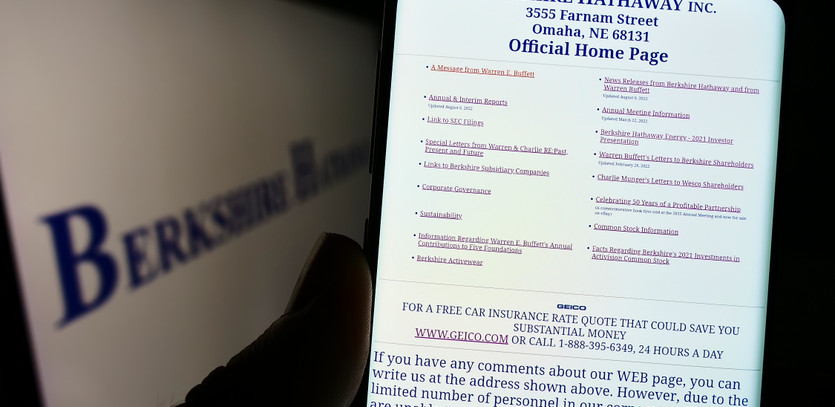In the first quarter of 2023, Berkshire Hathaway, the multinational conglomerate holding company spearheaded by the legendary investor Warren Buffett, made major shifts in its investment portfolio. The changes are a testament to the company's evolving investment strategy and its adaptability to the dynamic global economic landscape. This article explores these significant moves, providing an in-depth analysis of Berkshire's newly-acquired stakes in Capital One and Taiwan Semiconductor Manufacturing Co (TSMC), and the complete divestment from the Bank of New York Mellon (BNY Mellon).
Warren Buffett, known as the "Oracle of Omaha," has always emphasized the importance of value investing. His philosophy of buying shares in businesses that appear undervalued according to intrinsic value analysis has significantly influenced the world of finance. The recent portfolio adjustments reflect this belief, as Berkshire Hathaway aims to maximize its long-term growth potential.
Berkshire Hathaway's Investment in Capital One
In Q1 2023, Berkshire Hathaway added a significant stake in Capital One Financial Corp., a diversified banking institution that provides an extensive range of financial products and services to consumers, small businesses, and commercial clients. This move indicates a heightened interest in the banking sector, an arena where Buffett has found consistent value over the years.
Capital One is one of the most recognized brands in America, known for its credit card offerings, auto loans, savings accounts, and banking services. Its robust customer base and a diverse array of products present an opportunity for steady returns. Moreover, Capital One's strategic focus on digital banking has positioned it favorably in a rapidly evolving financial industry that increasingly values digital solutions and data-driven strategies over traditional banking methods.
Buffett's investment in Capital One can be seen as a strong endorsement of the company's business model and its potential for future growth. The investment also aligns with Buffett's practice of investing in industries and companies he understands and believes have a sustainable competitive advantage.
The Strategic Addition of TSMC to Berkshire's Portfolio
Further broadening its scope, Berkshire Hathaway has also added shares of Taiwan Semiconductor Manufacturing Co (TSMC) to its portfolio. As the world's largest dedicated independent semiconductor foundry, TSMC has emerged as an industry powerhouse, manufacturing chips for leading tech companies around the globe.
This move underscores Berkshire's growing interest in the tech sector, which has come to the fore at a time when a global semiconductor shortage has underscored the sector's critical importance. This investment might seem unconventional given Buffett's past apprehension towards tech investments, citing his lack of understanding of the tech world. However, TSMC's robust market position, healthy demand, and significant role in the technology supply chain have likely factored into making it an appealing investment.
Investing in TSMC also means Berkshire is betting on the continuous growth of the tech industry. As more industries embrace digital transformation, the demand for semiconductors and the critical role they play in various technologies is only set to rise.
Berkshire Hathaway's Exit from BNY Mellon
While the spotlight shines on Berkshire's new acquisitions, it's equally important to note its divestments. The company made headlines by selling off its entire stake in BNY Mellon, a distinguished banking and financial services company. The specific reasons behind this move were not publicly articulated, but a potential motivation could be a desire to streamline Berkshire's holdings or a shift in Buffett's valuation of the company.
The decision to exit BNY Mellon is not an isolated one. Over the past few years, Berkshire Hathaway has reduced its exposure to traditional banking stocks, trimming its positions in other major banks, such as Wells Fargo and JPMorgan Chase. This could be seen as a reflection of a strategic reassessment of the banking sector's prospects, perhaps driven by the impacts of the pandemic, low-interest rates, or increased competition from fintech companies.
Buffett, known for his long-term investment strategy, might have concluded that other sectors present more promising opportunities. This strategic shift could also be seen as a move to diversify the portfolio further, spreading the risk across a broader range of industries and sectors.
Navigating the Winds of Change: A Strategic Shift in Berkshire's Portfolio
These recent moves by Berkshire Hathaway indicate a potential strategic shift. The company seems to be pivoting away from traditional banking stocks, instead favoring more diversified financial institutions like Capital One and tech industry heavyweights such as TSMC. The changes echo the broader trends in the global financial landscape, with digitization driving the evolution of the banking industry and the tech sector becoming increasingly vital.
While the full reasoning behind these decisions is known only to Berkshire's management, these moves align well with the company's value-oriented investing strategy. Both Capital One and TSMC are market leaders in their respective industries and exhibit strong potential for consistent earnings. Buffett's belief in investing in companies with stable earnings and a competitive edge further cements these decisions.
In conclusion, the Q1 2023 moves by Berkshire Hathaway provide an insight into the evolving investment strategies of one of the world's most admired investors. As Buffett navigates the complexities of the global economy, his decisions continue to carry substantial weight in the financial world. These shifts in Berkshire's portfolio underline the importance of adaptability and strategic reassessment in successful investing. As always, individual investors should consider their risk tolerance, investment goals, and other factors before making similar moves.
Berkshire Hathaway: A Journey from Textiles to a Global Conglomerate
Berkshire Hathaway Inc. has a rich and fascinating history, with roots extending back to the mid-19th century. Founded in 1839 as a textile manufacturing company in Rhode Island, it underwent several transformations before being taken over by Warren Buffett in the mid-1960s. Originally, Berkshire Hathaway comprised multiple textile mills, but as the industry declined, Buffett steered the company away from its origins, instead investing in insurance, a move that would lay the foundation for its future success.
Under Buffett's stewardship, Berkshire Hathaway has grown into a massive multinational conglomerate, holding major stakes in numerous companies across a wide variety of industries. From insurance and utilities to food and clothing, Berkshire's portfolio is incredibly diverse. Its most notable holdings include household names like Geico, Duracell, Dairy Queen, and significant portions of Coca-Cola, American Express, and Apple. Warren Buffett, with his value investing strategy and long-term perspective, has transformed Berkshire Hathaway into one of the largest publicly-traded companies in the world, demonstrating the power of patient, strategic investing.





